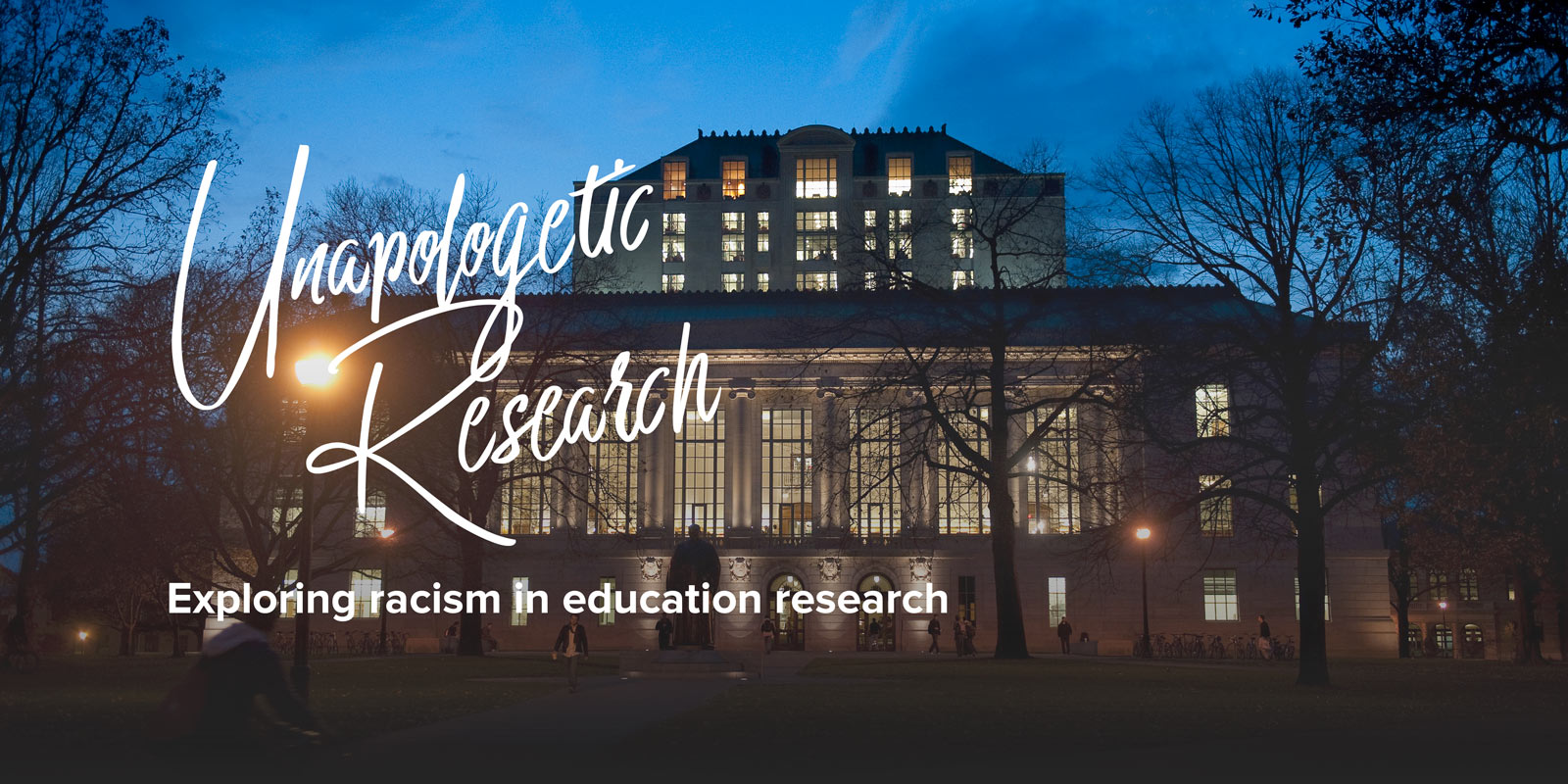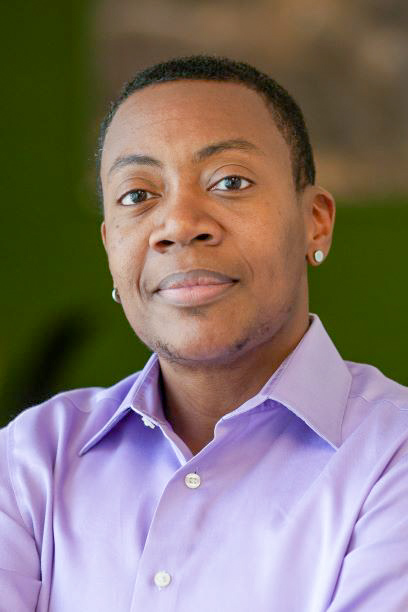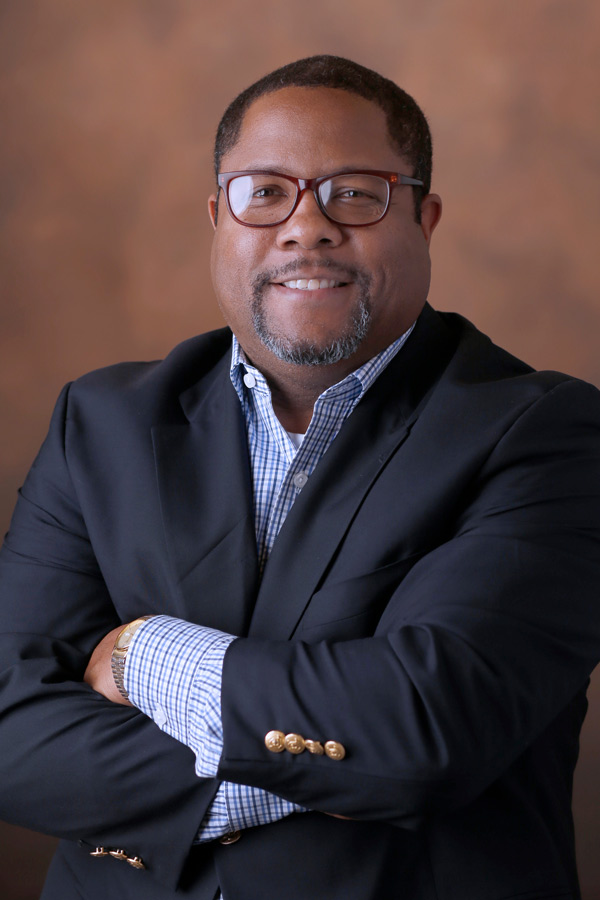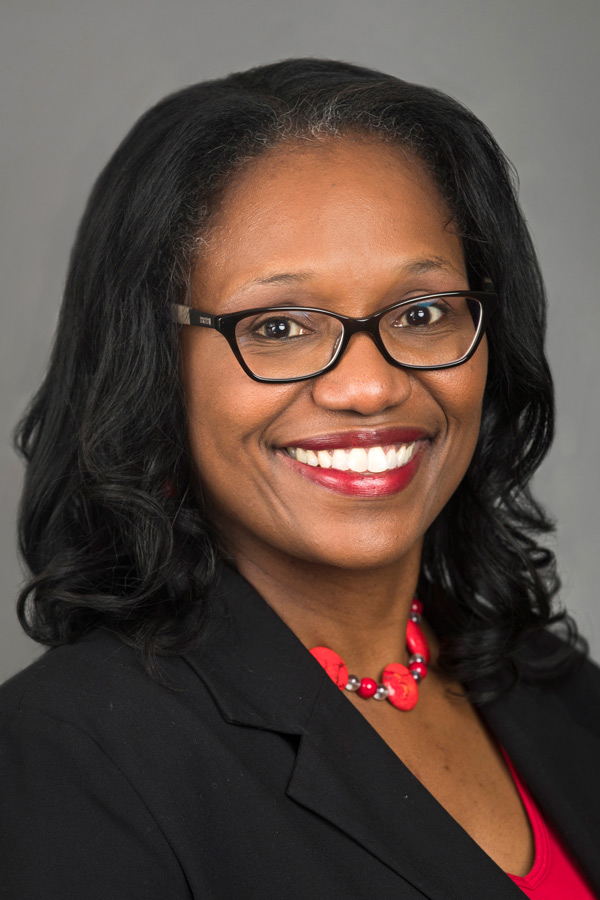
Racial bias pervades American institutions. Nowhere is it more entrenched than in academic research.
Decades of biases are baked into academic research. Consider the field of higher education and student affairs alone: Historically and even today, white men have been studied and their experiences have become universal for understanding how every other group develops while attending college, said Lori Patton Davis, chair of the Department of Educational Studies and professor of higher education and student affairs. That’s not unique to the education field.
“Any time research situates white people as the default, it’s inherently anti-black and inherently problematic, especially when it’s used to frame other people’s experiences,” said Patton Davis.
Contemporary research, while more inclusive, is far from achieving parity. When built upon those older theories and models, it can also be less representative. Then, findings marginalize and alienate people of color, resulting in policies dictated by partial truths rooted in predominantly white experiences.
As the college responded to racial injustice in 2020, Patton Davis and Penny Pasque, professor and the college’s director of qualitative methods, have advocated for making research more equitable and more accurate. They have partnered with the Office of Advancement to create a webinar series. Unapologetic Educational Research: Addressing, Anti-blackness, Racism and White Supremacy launches Oct. 1 and will feature alumni sharing their expertise.
“Unapologetic educational research moves beyond a standardized way of doing research,” Patton Davis said. It doesn’t sanitize the issues.
“It’s a push for people who are engaging in this work to not be afraid to study these pressing topics — to center minoritized voices, name the issues that we’re seeing and not to feel compelled to run away from them,” Patton Davis said. “So, to do the work, unapologetically.”
The series will examine not only conducting research centered on race, but how to make any research more just and equitable, Pasque said.
“If you’re doing research on STEM education in grade schools or undergraduates in college, how are you unapologetically paying attention to anti-blackness, racism and white supremacy in your research, even if it’s not the topic?” Pasque said. “Or it could be the topic, but how are you conceptualizing research in order to really make that difference?”
“What does it mean to really do strong anti-racist research from beginning to end — designing your research questions, designing your methods, connecting with participants and people in your studies” and even disseminating the findings.
The series will address that arch of unapologetic research by hosting three alumni who have centered their careers on exploring issues of racism. More sessions are being planned.
Unapologetic Research Series
Webinar schedule
October 1, 3 p.m., EST
D-L Stewart
Colorado State University
Watch Oct. 1 replay
October 22, 3 p.m., EST
Richard Milner
Vanderbilt University
Watch Oct. 22 replay
November 12, 3 p.m., EST
April Peters-Hawkins
University of Houston
Watch Nov. 12 replay
More sessions will be announced soon

D-L Stewart, Oct. 1
Some research methods, particularly on the qualitative side, emphasize purposeful sampling of subjects. But any study is stronger if researchers don’t just settle for those who respond to recruitment emails, said D-L Stewart, co-chair of the Student Affairs in Higher Education program at Colorado State University and the first speaker for the series.
“How can I purposefully engage people who have different perspectives?” said Stewart, ’98 MA, ’01 PhD, whose preferred pronouns are he/him/his and they/them/theirs. “It may be valuable to make sure you have a strong representation of people with different experiences on a topic that may have nothing to do on its face with race.”
Early COVID-19 data was not disaggregated by race until communities of color spoke up, Stewart said. When death and infection rates were finally broken down, disparities in health outcomes for Black, indigenous and Latinx populations became shockingly clear. “But there was no empirical data to support that until people demanded that happen in the research.”
Stewart studies how marginalized students experience campus environments at predominantly white colleges and universities, focusing on the intersections of race, gender and sexuality. He also considers ways universities engage in matters of diversity, inclusion, equity and justice.
That perspective is critical in times like these. As campuses establish norms around wearing face masks and other COVID-19 guidelines, disaggregating survey data by race and in other ways can yield valuable information about student attitudes, Stewart said.
“Are students of color more prone to wear masks? Are students in certain majors more prone to physically distance? These answers have import for how to frame messaging and to whom we direct it.”

Richard Milner, Oct. 22
These epochal times have caused introspection by many, including academic researchers, and not just those in the education field.
Since Breonna Taylor’s and George Floyd’s deaths, Rich Milner, ’00 MA, ’01 PhD, has received weekly requests to speak about issues of racism in education. The Cornelius Vanderbilt Chair of Education in the Department of Teaching and Learning at Vanderbilt University is the series’ second speaker.
“People are drawn to do more than have empathy,” Milner said. “I think researchers are moving to this place of saying, ‘Wait a minute. We’ve got to address racial justice by doing something more than collecting data. I want to research and study racial injustice, but also help develop applied mechanisms through my research to disrupt the injustices and inequity.’”
His own research examines practices and policies that help urban school teachers be most effective. To best study racial inequities and challenges in education and society, researchers must immerse themselves in the communities they hope to research while also fully examining their own biases — especially if they’re studying communities of a different race, he said.
“We’re not robots,” Milner said. “We all have feelings, beliefs that are shaped by our world view, by our own experiences, our own paradigms, our own privileges. And so, because of that, to not understand, address and name those biases, that subjectivity, can actually do more harm than good.”
Impactful research on racial justice requires a level of commitment that goes beyond showing up, interviewing participants and observing phenomena, Milner said. It requires immersion on par with that of an anthropologist — getting your haircut in the communities, buying groceries there, eating meals and even living among the people your research will impact.
“These deep ways of coming to know and understand,” he said, “provide a level of knowledge that helps a researcher share findings that make a difference for social action and impact.”

April Peters-Hawkins, Nov. 12
After receiving her doctorate, April Peters-Hawkins, ’02 MA, ’03 PhD, became immersed in the challenges faced by Black, female leaders by becoming a high school principal in Baltimore. Now, she is associate chair of educational leadership and policy studies at the University of Houston, and will be the third speaker in the series.
“When I transitioned into academia, I was really interested in investigating the experiences of Black women in urban settings, high school principals mostly,” she said. “What I learned is that oftentimes they inherited the worst of the worst schools. There were more significant challenges for certain women.”
That dynamic and the implicit bias toward Black, female school leaders became a research focus. She recalls experiencing anti-blackness when visitors assumed a white, male colleague was the principal instead of her.
“It’s really interesting to me how whiteness is read as authority,” she said. “I could be standing there with a walkie talkie, a handful of keys and a suit, and yet be overlooked as the principal.
I know of many other Black women that happened to, based on my research.”
That lived experience generates passion that is invaluable for research, her presentation will show.
“There are people for whom their existence in this country — and in many places — is heavy,” she said. “How do we use our research to be emancipatory and informative, so that we can start to chisel away at some of the structural oppression that exists?”
Dismantling racism is a significant challenge, Peters-Hawkins said. “But there are things that scholars can do to engage in these efforts. I think research that is emancipatory and transparent is one way to do that.”

